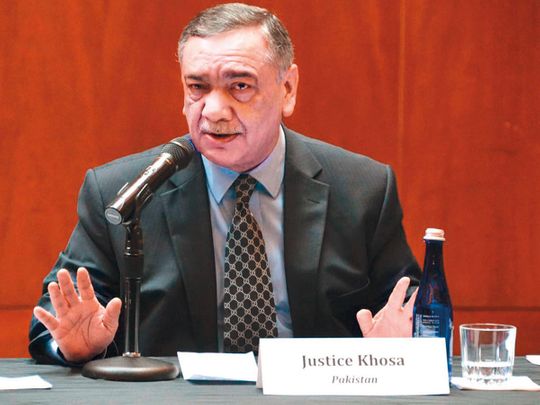
ISLAMABAD: While re-emphasising his vision of speedy and inexpensive justice in the country, Chief Justice of Pakistan (CJP) Justice Asif Saeed Khan Khosa on Saturday said courts were responsible for provision of expeditious and inexpensive justice to people and victims.
Addressing a conference at the Judicial Academy of Islamabad, the top judge of Pakistan asserted that the experiment of establishment of model courts was intended to execute Article 37-D of the Constitution of Pakistan.
Speaking to civil judges and judges of high courts, the chief justice said innovative methods and Information Technology-based apps were being introduced to monitor and guide the courts in dispensation of justice speedily.
He asked the presiding officers of courts to discourage culture of adjournment. In case a request is made by a junior advocate for adjournment of a case due to his senior advocate’s engagement in other courts, you should ask the junior advocate to present the argument and take the case forward to its legal and logical end.
Calling his presiding officers his ‘judicial heroes’, the chief justice maintained that every possible effort should be made to adjudicate pending cases as soon as possible.
He also highlighted loopholes in police system saying, “Police must immediately investigate a case, and submit its challan. Under judicial policy, cases would proceed under time-bound criminal trial regimen.
While giving Britain, Canada and other countries’ examples the chief justice said there, trials are commenced under pre-defined period. “Provision of justice can be made easier if time is set for cases to be wrapped up,” he said.
He called it an unfortunate that the improvement of judicial system was not on the Parliament’s list of priorities as recommendations and amendments were not tabled in the parliament for improvement in judicial policy.
While advocating model courts’ establishment, the chief justice said 3,000 judges announced verdicts on 3.4 million cases last year in the country.
Appreciating the performance of judges of model courts, he said the model trial courts will not grant adjournments in order to ensure timely conclusion of cases.
“By fixing a time it will be easier to get justice. If the lawyer cannot be present his junior will be appointed, if the plaintiff is not present an alternative way will be found. We will ensure chemical examiners and forensic authorities submit the report in a fixed time,” he said.












